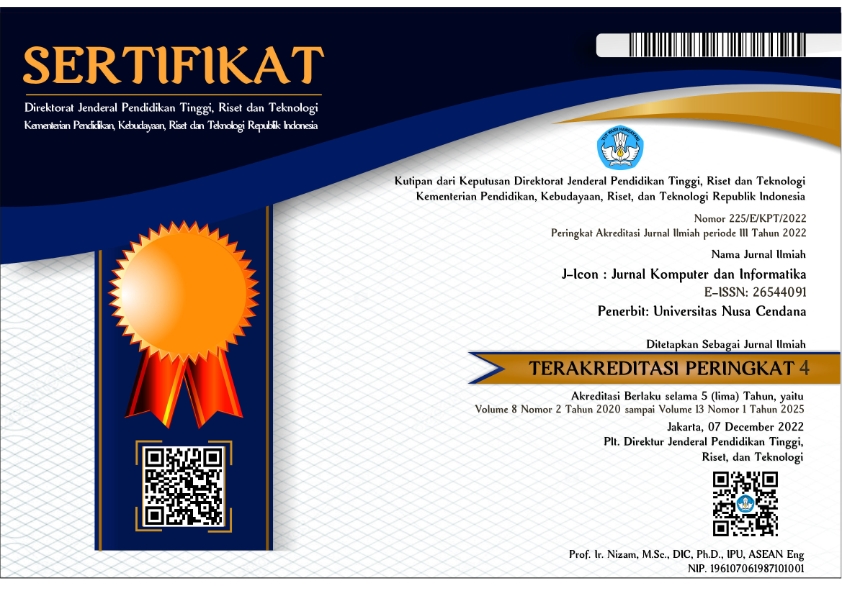The Effectiveness of Using the LMS Platform in the Implementation of Distance Learning
Abstract
In the current era, technology has developed very rapidly, where smartphone and laptop users are increasing very rapidly, of course with the help of these tools we can complete various jobs and also to learn. This research was conducted by studying the literature with data collected from several sources related to the topic and by doing this research we can find out how effective the use of LMS is. During the current pandemic, learning was carried out using distance learning methods with many methods, one of which was the Learning Management System (LMS). There are many things that must be considered in the Distance Learning process, including the use of information technology and the given learning model. By utilizing this LMS learning model, the distant learning process can take place effectively.
Downloads
References
AAAAAS. Selatan, “EFEKTIVITAS PEMBELAJARAN DARING MENGGUNAKAN MEDIA ONLINE SELAMA PANDEMI COVID-19 PADA MATA PELAJARAN MATEMATIKA[1] S. Selatan, “EFEKTIVITAS PEMBELAJARAN DARING MENGGUNAKAN MEDIA ONLINE SELAMA PANDEMI COVID-19 PADA MATA PELAJARAN MATEMATIKA THE EFFECTIVENESS OF E-LEARNING USING ONLINE MEDIA DURING THE COVID-19 PANDEMIC IN MATHEMATICS,” vol. 2, no. 1, pp. 1–12, 2020.
G. K. Putri and S. A. Y. Dewi, “Pengaruh Model Pembelajaran Jarak Jauh Berbasis Google Classroom Effect Of Google Classroom-Based Distance Learning Model,” Al-Fikrah, vol. 2, no. 1, pp. 60–79, 2019.
A. Aurora and H. Effendi, “JTEV (JURNAL TEKNIK ELEKTRO DAN VOKASIONAL) Pengaruh Penggunaan Media Pembelajaran E-learning terhadap Motivasi Belajar Mahasiswa di Universitas Negeri Padang,” Univ. Negeri Padang. JTEV, vol. 5, no. 2, pp. 11–16, 2019, [Online]. Available: http://ejournal.unp.ac.id/index.php/jtev/index.
Abdul Latip, “Peran Literasi Teknologi Informasi Dan Komunikasi Pada Pembelajaran Jarak Jauh Di Masa Pandemi Covid-19,” EduTeach J. Edukasi dan Teknol. Pembelajaran, vol. 1, no. 2, pp. 108–116, 2020, doi: 10.37859/eduteach.v1i2.1956.
A. D. Krisnanto and Y. Anistyasari, “Analisis Tingkat Penerimaan Mahasiswa Terhadap Pembelajaran Daring Di Masa Pandemi Covid-19 ( Studi Kasus Mahasiswa Jurusan Teknik Informatika Universitas Negeri Surabaya ),” IT-Edu J. Inf. Technol. Educ., vol. 05, no. 01, pp. 398–405, 2021, [Online]. Available: https://ejournal.unesa.ac.id/index.php/it-edu/article/view/37757.
R. Pakpahan and Y. Fitriani, “Analisa Pemafaatan Teknologi Informasi Dalam Pemeblajaran Jarak Jauh Di Tengah Pandemi Virus Corona Covid-19,” JISAMAR (Journal Inf. Syst. Applied, Manag. Account. Researh), vol. 4, no. 2, pp. 30–36, 2020.
F. T. Industri and J. Barat, “PENGARUH PENGGUNAAN BLENDED LEARNING BERBASIS,” no. 100, pp. 249–260.
D. Yana and A. Adam, “Efektivitas Penggunaan Platform Lms Sebagai Media Pembelajaran Berbasis Blended Learning Terhadap Hasil Belajar Mahasiswa,” J. Dimens., vol. 8, no. 1, pp. 1–12, 2019, doi: 10.33373/dms.v8i1.1816.
I. F. Ahmad, “Asesmen Alternatif Dalam Pembelajaran Jarak Jauh Pada Masa Darurat Penyebaran Coronavirus Disease (Covid-19) Di Indonesia,” Pedagog. J. Pendidik., vol. 7, no. 1, pp. 195–222, 2020, doi: 10.33650/pjp.v7i1.1136.
H. E. Prabowo1 and S. S. , Ulfah Mediaty Arief2, Subiyanto3, “Kesesuaian Learning Management System (Lms) Schoology Sebagai Teknologi Penunjang Kegiatan Belajar Mengajar Siswa Sekolah Menengah Pertama Di Era Generasi Z (Studi Kasus Smp It Insan Cendekia Semarang),” vol. 8, no. 1, pp. 46–50, 2019.
A. M. Basar, “Problematika Pembelajaran Jarak Jauh Pada Masa Pandemi Covid-19,” Edunesia J. Ilm. Pendidik., vol. 2, no. 1, pp. 208–218, 2021, doi: 10.51276/edu.v2i1.112.
W. Sari, A. M. Rifki, and M. Karmila, “Pembelajaran Jarak Jauh Pada Masa Darurat Covid 19,” J. MAPPESONA, no. 1, p. 12, 2020.
N. Maharani, T. Murdiyanto, and A. Hadiyan, “Pengaruh Model Pembelajaran Creative Problem Solving (CPS) dalam Pembelajaran Jarak Jauh (PJJ) terhadap Kemampuan Berpikir Kritis Matematis Siswa,” vol. 3, no. 1, pp. 48–57, 2021.
I. P. Yoga Purandina and I. M. Astra Winaya, “Pendidikan Karakter di Lingkungan Keluarga Selama Pembelajaran Jarak Jauh pada Masa Pandemi COVID-19,” Cetta J. Ilmu Pendidik., vol. 3, no. 2, pp. 270–290, 2020, doi: 10.37329/cetta.v3i2.454.
N. B. Argaheni, “SISTEMATIK REVIEW : DAMPAK PERKULIAHAN DARING SAAT PANDEMI COVID-19 TERHADAP MAHASISWA INDONESIA A Systematic Review : The Impact of Online Lectures during the COVID-19 Pandemic Against Indonesian Students,” vol. 8, no. 2, 2020.
H. Kurniawan, E. Susanti, and N. Arriyani, “Menjadi Guru yang Siap di masa Pandemi Covid-19 , Melalui Workshop Penggunaan Edmodo dan Google Classroom pada Pembelajaran Daring,” vol. 11, 2021.
R. M. Napitupulu, “Dampak pandemi Covid-19 terhadap kepuasan pembelajaran jarak jauh,” J. Inov. Teknol. Pendidik., vol. 7, no. 1, pp. 23–33, 2020, doi: 10.21831/jitp.v7i1.32771.
P. Bagi, G. Sekolah, and M. Pertama, “Jurnal Teknologi Informasi dan Pendidikan,” vol. 11, no. 2, 2018.
D. Haqien and A. A. Rahman, “Pemanfaatan Zoom Meeting untuk Proses Pembelajaran pada Masa Pandemi Covid-19,” SAP (Susunan Artik. Pendidikan), vol. 5, no. 1, 2020, doi: 10.30998/sap.v5i1.6511.
M. K. Pembelajaran, O. Ananda, and H. Elyas, “Penggunaan model pembelajaran e-learning dalam meningkatkan kualitas pembelajaran,” no. April, 2018.
Copyright (c) 2021 J-Icon : Jurnal Komputer dan Informatika

This work is licensed under a Creative Commons Attribution 4.0 International License.
The author submitting the manuscript must understand and agree that if accepted for publication, authors retain copyright and grant the journal right of first publication with the work simultaneously licensed under a Creative Commons Attribution (CC-BY) 4.0 License that allows others to share the work with an acknowledgment of the work’s authorship and initial publication in this journal.
 Restu Pranansha Anugerah(1*)
Restu Pranansha Anugerah(1*)




